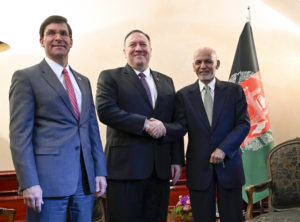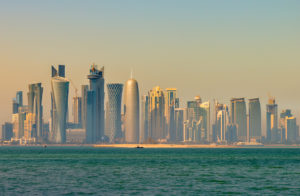Goodbye to the Old Oil Order
Replacing the petroleum-fueled world we’ve known for decades is an anemic, possibly even declining, demand that is likely to force suppliers to fight over a diminishing market. SarahTz / CC-BY-2.0
1
2
3
SarahTz / CC-BY-2.0
1
2
3
But what happens if confidence in the eventual resurgence of demand begins to wither? Then the incentives to cooperate begin to evaporate, too, and it’s every producer for itself in a mad scramble to protect market share. This new reality — a world in which “peak oil demand,” rather than “peak oil,” will shape the consciousness of major players — is what the Doha catastrophe foreshadowed.
At the beginning of this century, many energy analysts were convinced that we were at the edge of the arrival of “peak oil”; a peak, that is, in the output of petroleum in which planetary reserves would be exhausted long before the demand for oil disappeared, triggering a global economic crisis. As a result of advances in drilling technology, however, the supply of oil has continued to grow, while demand has unexpectedly begun to stall. This can be traced both to slowing economic growth globally and to an accelerating “green revolution” in which the planet will be transitioning to non-carbon fuel sources. With most nations now committed to measures aimed at reducing emissions of greenhouse gases under the just-signed Paris climate accord, the demand for oil is likely to experience significant declines in the years ahead. In other words, global oil demand will peak long before supplies begin to run low, creating a monumental challenge for the oil-producing countries.
This is no theoretical construct. It’s reality itself. Net consumption of oil in the advanced industrialized nations has already dropped from 50 million barrels per day in 2005 to 45 million barrels in 2014. Further declines are in store as strict fuel efficiency standards for the production of new vehicles and other climate-related measures take effect, the price of solar and wind power continues to fall, and other alternative energy sources come on line. While the demand for oil does continue to rise in the developing world, even there it’s not climbing at rates previously taken for granted. With such countries also beginning to impose tougher constraints on carbon emissions, global consumption is expected to reach a peak and begin an inexorable decline. According to experts Thijs Van de Graaf and Aviel Verbruggen, overall world peak demand could be reached as early as 2020.
In such a world, high-cost oil producers will be driven out of the market and the advantage — such as it is — will lie with the lowest-cost ones. Countries that depend on petroleum exports for a large share of their revenues will come under increasing pressure to move away from excessive reliance on oil. This may have been another consideration in the Saudi decision at Doha. In the months leading up to the April meeting, senior Saudi officials dropped hints that they were beginning to plan for a post-petroleum era and that Deputy Crown Prince bin Salman would play a key role in overseeing the transition.
On April 1st, the prince himself indicated that steps were underway to begin this process. As part of the effort, he announced, he was planning an initial public offering of shares in state-owned Saudi Aramco, the world’s number one oil producer, and would transfer the proceeds, an estimated $2 trillion, to its Public Investment Fund (PIF). “IPOing Aramco and transferring its shares to PIF will technically make investments the source of Saudi government revenue, not oil,” the prince pointed out. “What is left now is to diversify investments. So within 20 years, we will be an economy or state that doesn’t depend mainly on oil.”
For a country that more than any other has rested its claim to wealth and power on the production and sale of petroleum, this is a revolutionary statement. If Saudi Arabia says it is ready to begin a move away from reliance on petroleum, we are indeed entering a new world in which, among other things, the titans of oil production will no longer hold sway over our lives as they have in the past.
This, in fact, appears to be the outlook adopted by Prince Mohammed in the wake of the Doha debacle. In announcing the kingdom’s new economic blueprint on April 25th, he vowed to liberate the country from its “addiction” to oil.” This will not, of course, be easy to achieve, given the kingdom’s heavy reliance on oil revenues and lack of plausible alternatives. The 30-year-old prince could also face opposition from within the royal family to his audacious moves (as well as his blundering ones in Yemen and possibly elsewhere). Whatever the fate of the Saudi royals, however, if predictions of a future peak in world oil demand prove accurate, the debacle in Doha will be seen as marking the beginning of the end of the old oil order.
Michael T. Klare, a TomDispatch regular, is a professor of peace and world security studies at Hampshire College and the author, most recently, of The Race for What’s Left. A documentary movie version of his book Blood and Oil is available from the Media Education Foundation. Follow him on Twitter at @mklare1.
Follow TomDispatch on Twitter and join us on Facebook. Check out the newest Dispatch Book, Nick Turse’s Tomorrow’s Battlefield: U.S. Proxy Wars and Secret Ops in Africa, and Tom Engelhardt’s latest book, Shadow Government: Surveillance, Secret Wars, and a Global Security State in a Single-Superpower World.
Copyright 2016 Michael T. Klare Your support matters…Independent journalism is under threat and overshadowed by heavily funded mainstream media.
You can help level the playing field. Become a member.
Your tax-deductible contribution keeps us digging beneath the headlines to give you thought-provoking, investigative reporting and analysis that unearths what's really happening- without compromise.
Give today to support our courageous, independent journalists.






You need to be a supporter to comment.
There are currently no responses to this article.
Be the first to respond.